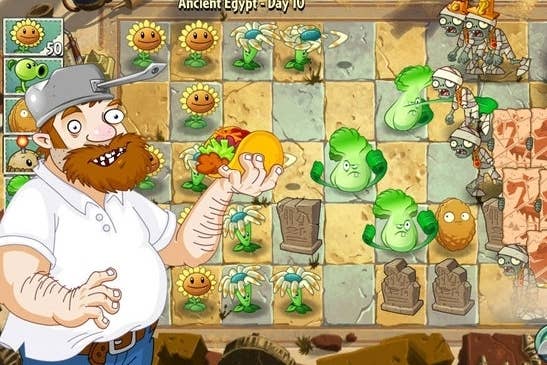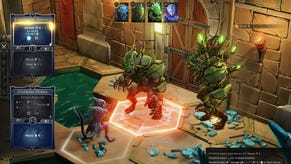Plants vs. Zombies 2 vs. China
PopCap's Leo Liu shares lessons learned from Far East launch of free-to-play foliage defense game
At last year's Game Developers Conference, PopCap head of strategic development James Gwertzman talked about the difficulties of bringing the company into China. PopCap China general manager Leo Liu expanded on that subject at this year's show, today delivering a talk about taking one specific game--the free-to-play Plants vs. Zombies 2--into China.
Liu began his presentation talking about the opportunity for mobile growth in Asia. Last year, the Chinese market was forecast to produce revenues of $1.5 billion. By the end of 2015, it could be as high as $4.5 billion, Liu said, with the growth rate projected between 50 percent and 150 percent. As enticing as that growth is, Liu said the local developers dominate the market with trading card games and action RPGs. Additionally, Android users account for 60 percent of the revenue in China, even though iOS users tend to have a higher average revenue per user and retention.
Everyone knows the Chinese market is different, but Liu said looking at Plants vs. Zombies 2 as a case study could shed some light on just how different it really is. The game launched in New Zealand on July 9. Within two hours, the first pirated version launched in China. Within 24 hours, the first cracked version (giving unlimited gold) was available in China. Within five days, Liu said more than 6 million people in China had downloaded pirated versions of the game. The huge popularity of the game in China led to that piracy, but Liu said it creates a challenge as well as an opportunity.
One concern is that Chinese users monetize differently. The pay rate for Chinese users is 1/87th that of the rest of the world. But once they actually pay, the ARPU per user is similar, Liu said. To help with this, PopCap created a more localized version of the game with original content, higher difficulties, and better rewards. Additionally, they tied the unlocking of additional plants not just to the completion of a level, but to the fulfillment of other objectives that would require them to play through levels multiple times. The Chinese version of the game also introduced a hard currency, diamonds, that would allow them to pay money to acquire various limited elements in the game.
Plants vs. Zombies 2 properly launched in August on iOS in China, and quickly topped the highest grossing app charts. However, before long, the game slipped to second place, and its rating on the App Store fell to two stars out of five. Interestingly, the top three games on the charts all had ratings of three stars or lower. Liu said it wasn't because the game was bad or unpopular, but there was a joke around the office that if your rating is higher than three stars, you won't be in the top three apps on the iOS charts in China. One of the reasons for the review score for Plants vs. Zombies 2 was that PopCap was late with the game, launching it in China weeks after the soft launch in New Zealand. Second, the company updated the game to thwart various hacking tools, and many players that updated and found their hacks no longer useful gave the game 1-star reviews in retribution. That degree of review bombing was only happening in China, Liu said, and Apple noticed and took some of those low reviews out of the equation. In some ways, Liu said it was an acknowledgement of achievement because competitors could also get into the review bombing and organize their own low score campaigns.
The Android launch for Plants vs. Zombies 2 in China happened in September, and the big challenge they faced was device fragmentation. In the US, publishers need to worry about 14 top devices, Liu said, but in China, there are about 10 times as many. The top 10 devices only represents 18.9 percent of the market, so there's a ton of work to be done to make games work on all hardware, as well as getting them on all 300+ Android storefronts there.
Another learning from the launch of the original Plants vs. Zombies in China is that AAA quality is meaningless if it can't reach the players. The larger the size of the client that needs to be downloaded, the fewer users will be able to download it. Many Chinese phone users don't have WiFi, and their data plans include very low bandwidth caps. On Android, Plants vs. Zombies 2 takes up just 32MB. The running memory of the game is also kept under 80MB to make sure even those with low-end devices can run it. If people can't download or play a game, it doesn't matter how good it is.
Another big boost for Plants vs. Zombies 2 in China was the launch of the locally developed Kung Fu World stage update. The new set of levels for the game incorporated localized content like kung fu master zombies and drunken monk zombies into the game. Even though the Kung Fu World is the fourth set of levels players encounter in the game, it is the most frequently played world in China after the initial Egypt stage.
Despite all this, Liu said the most important thing to remember is that the game is built by creative people. It's not just software, so the most important thing is to ensure you have the right team and foster their passion for the project. That's the heart of a game's success, and the rest of these strategies can only capitalize on the potential that was already there.









